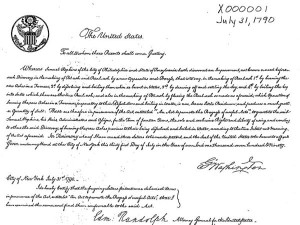A post from student blogger Nicole
It’s weird to think that our full patent application is almost due. Thinking back to the beginning of the semester, all the due dates seemed so far away and now that everything’s been corrected, it’s time to put it all together. I’ve come to the realization that there were a lot of things I left out or didn’t think to add to the application. Wording is important in a patent application. After having my detailed description reviewed by my outside mentor, he pointed out certain words that shouldn’t be used because they might be held against you. Looking back on them now I understand why. I have to be more careful when I start writing my own applications. There were also situations where I didn’t explain something broad enough or I wasn’t consistent with the language I was using, for example, calling it a device in my claims and then renaming it in my detailed description. Patents are all about consistency. This used to worry me and make me think that when I’m working for a company, I might leave things out on accident. But then I think about it again and realize I won’t be alone. There will be people in my company that will check my work, especially in the beginning when I’m new.
I also have a great deal of comfort from this program. It has helped me learn and make mistakes now, rather than at my future company. I think of this program as a trial run that provided real life examples of what it will be like to work in the real world as a patent agent. Many of the homework assignments such as the office actions or situations we’ve talked about will definitely be utilized while I’m working. I won’t hesitate to look back on all the assignments to help me with whatever situation I’m in at my job. The best part about the homework assignments is the feedback I receive from my teachers. Although it’s disappointing to submit something you thought was really good but the grade was lower than you expected, it’s what helps you learn the most. I really value the feedback I receive. It only helps me become more prepared for when I become a patent agent.

